Corporations Law Assignment: Legal Analysis of Key Issues
VerifiedAdded on 2021/05/31
|7
|2099
|41
Homework Assignment
AI Summary
This corporations law assignment provides detailed solutions to four key legal issues. The first question addresses the process of changing a company type under the Corporations Act 2001, including the requirements for special resolutions and ASIC filings. The second question examines the enforceability of a non-compete clause, analyzing the application of the corporate veil principle in the case of a former managing director starting a competing business. The third question delves into the impact of violating a company constitution, specifically whether a lease agreement executed in contradiction to the constitution is voidable. Finally, the fourth question offers legal advice to directors regarding the cancellation of a contract with a supplier, focusing on the application of the indoor management doctrine and the authority of the managing director.
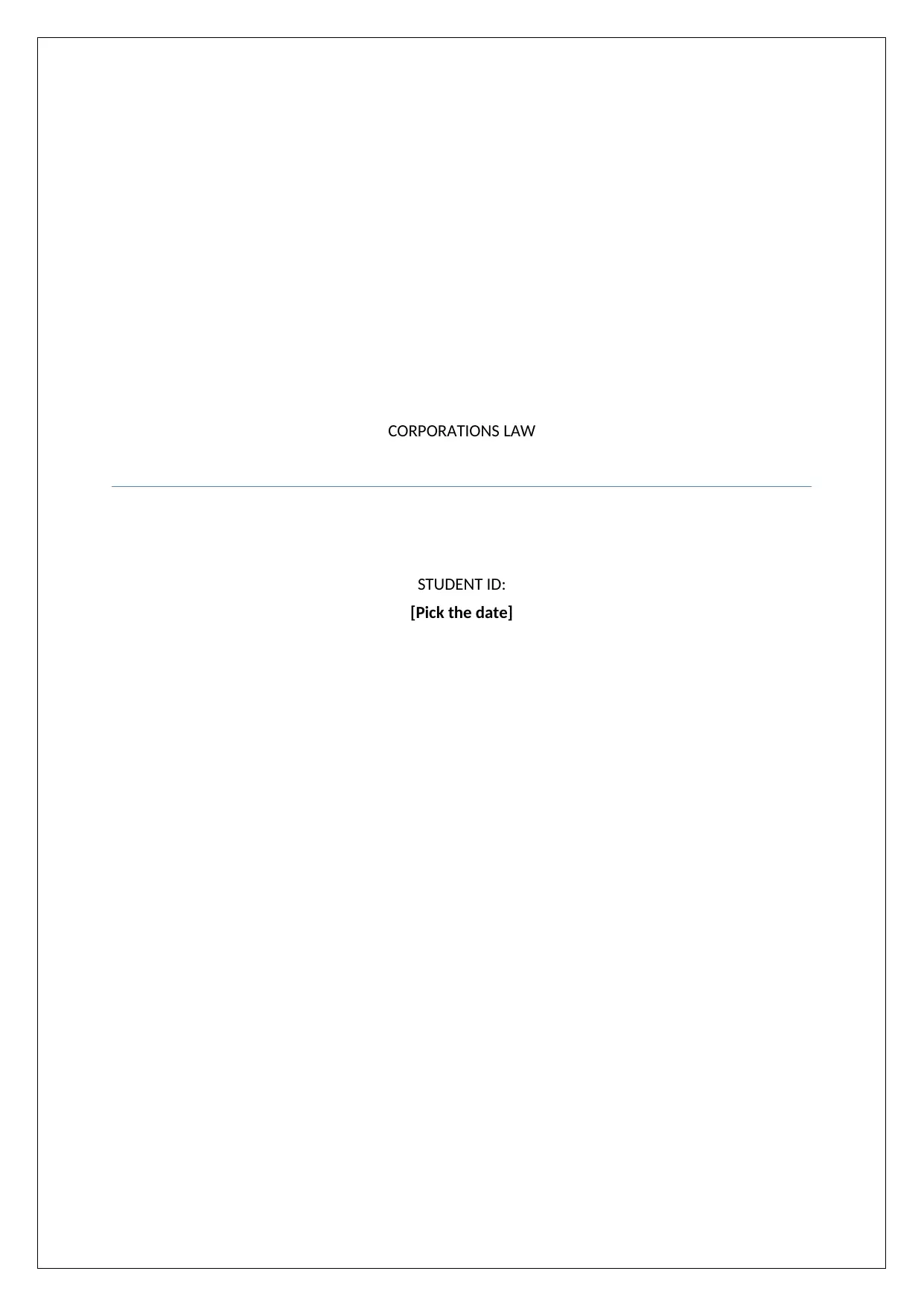
CORPORATIONS LAW
STUDENT ID:
[Pick the date]
STUDENT ID:
[Pick the date]
Paraphrase This Document
Need a fresh take? Get an instant paraphrase of this document with our AI Paraphraser
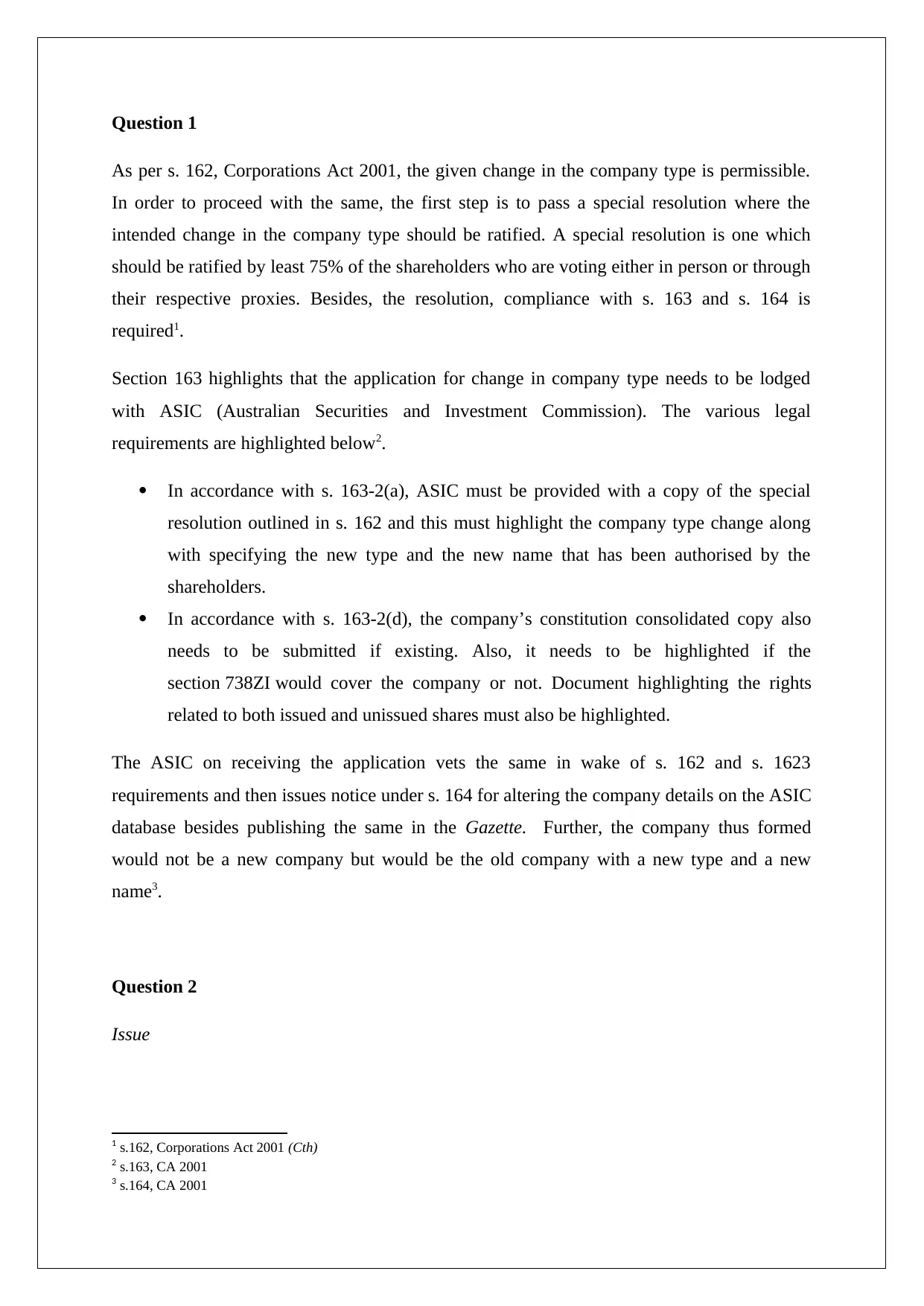
Question 1
As per s. 162, Corporations Act 2001, the given change in the company type is permissible.
In order to proceed with the same, the first step is to pass a special resolution where the
intended change in the company type should be ratified. A special resolution is one which
should be ratified by least 75% of the shareholders who are voting either in person or through
their respective proxies. Besides, the resolution, compliance with s. 163 and s. 164 is
required1.
Section 163 highlights that the application for change in company type needs to be lodged
with ASIC (Australian Securities and Investment Commission). The various legal
requirements are highlighted below2.
In accordance with s. 163-2(a), ASIC must be provided with a copy of the special
resolution outlined in s. 162 and this must highlight the company type change along
with specifying the new type and the new name that has been authorised by the
shareholders.
In accordance with s. 163-2(d), the company’s constitution consolidated copy also
needs to be submitted if existing. Also, it needs to be highlighted if the
section 738ZI would cover the company or not. Document highlighting the rights
related to both issued and unissued shares must also be highlighted.
The ASIC on receiving the application vets the same in wake of s. 162 and s. 1623
requirements and then issues notice under s. 164 for altering the company details on the ASIC
database besides publishing the same in the Gazette. Further, the company thus formed
would not be a new company but would be the old company with a new type and a new
name3.
Question 2
Issue
1 s.162, Corporations Act 2001 (Cth)
2 s.163, CA 2001
3 s.164, CA 2001
As per s. 162, Corporations Act 2001, the given change in the company type is permissible.
In order to proceed with the same, the first step is to pass a special resolution where the
intended change in the company type should be ratified. A special resolution is one which
should be ratified by least 75% of the shareholders who are voting either in person or through
their respective proxies. Besides, the resolution, compliance with s. 163 and s. 164 is
required1.
Section 163 highlights that the application for change in company type needs to be lodged
with ASIC (Australian Securities and Investment Commission). The various legal
requirements are highlighted below2.
In accordance with s. 163-2(a), ASIC must be provided with a copy of the special
resolution outlined in s. 162 and this must highlight the company type change along
with specifying the new type and the new name that has been authorised by the
shareholders.
In accordance with s. 163-2(d), the company’s constitution consolidated copy also
needs to be submitted if existing. Also, it needs to be highlighted if the
section 738ZI would cover the company or not. Document highlighting the rights
related to both issued and unissued shares must also be highlighted.
The ASIC on receiving the application vets the same in wake of s. 162 and s. 1623
requirements and then issues notice under s. 164 for altering the company details on the ASIC
database besides publishing the same in the Gazette. Further, the company thus formed
would not be a new company but would be the old company with a new type and a new
name3.
Question 2
Issue
1 s.162, Corporations Act 2001 (Cth)
2 s.163, CA 2001
3 s.164, CA 2001
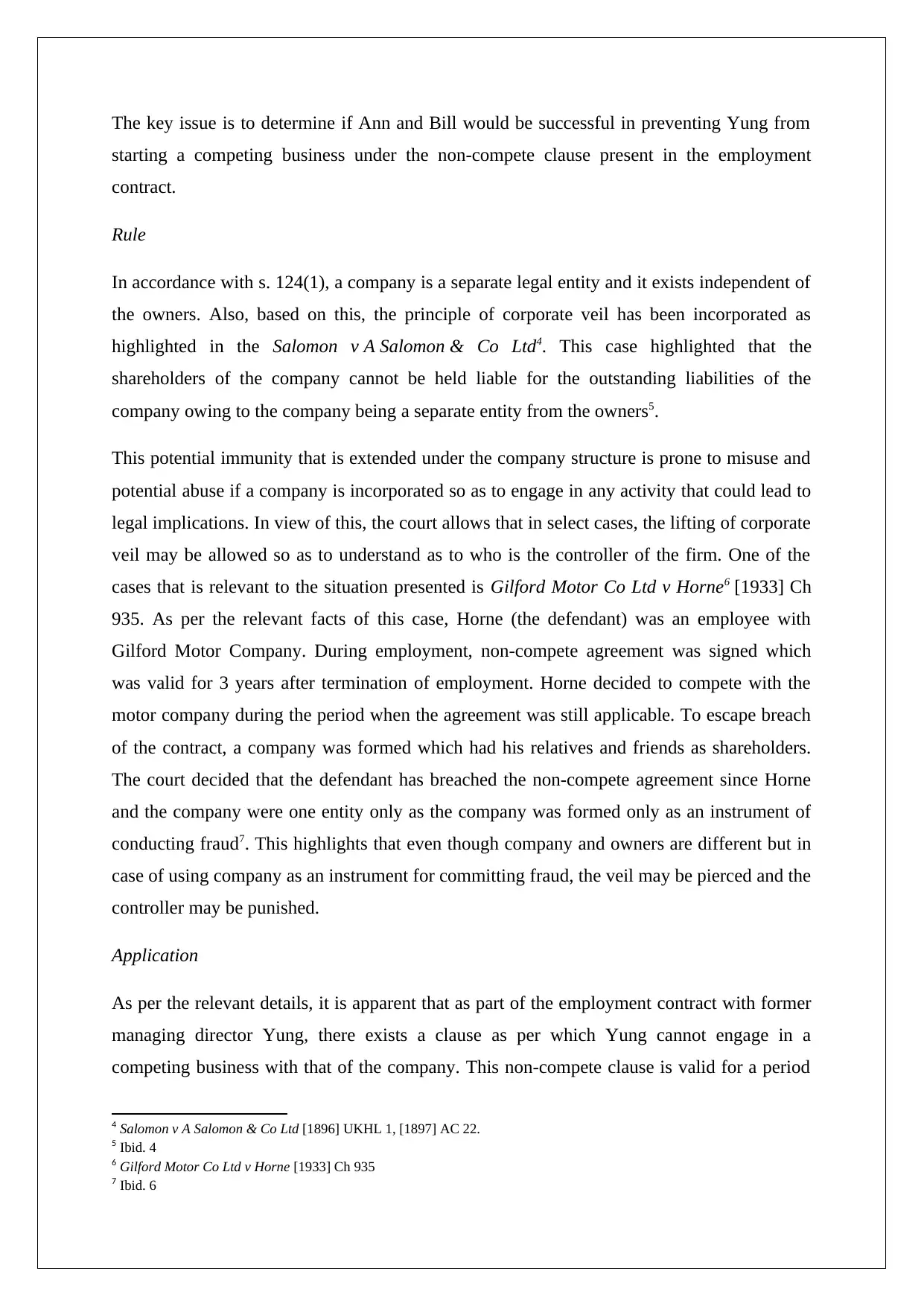
The key issue is to determine if Ann and Bill would be successful in preventing Yung from
starting a competing business under the non-compete clause present in the employment
contract.
Rule
In accordance with s. 124(1), a company is a separate legal entity and it exists independent of
the owners. Also, based on this, the principle of corporate veil has been incorporated as
highlighted in the Salomon v A Salomon & Co Ltd4. This case highlighted that the
shareholders of the company cannot be held liable for the outstanding liabilities of the
company owing to the company being a separate entity from the owners5.
This potential immunity that is extended under the company structure is prone to misuse and
potential abuse if a company is incorporated so as to engage in any activity that could lead to
legal implications. In view of this, the court allows that in select cases, the lifting of corporate
veil may be allowed so as to understand as to who is the controller of the firm. One of the
cases that is relevant to the situation presented is Gilford Motor Co Ltd v Horne6 [1933] Ch
935. As per the relevant facts of this case, Horne (the defendant) was an employee with
Gilford Motor Company. During employment, non-compete agreement was signed which
was valid for 3 years after termination of employment. Horne decided to compete with the
motor company during the period when the agreement was still applicable. To escape breach
of the contract, a company was formed which had his relatives and friends as shareholders.
The court decided that the defendant has breached the non-compete agreement since Horne
and the company were one entity only as the company was formed only as an instrument of
conducting fraud7. This highlights that even though company and owners are different but in
case of using company as an instrument for committing fraud, the veil may be pierced and the
controller may be punished.
Application
As per the relevant details, it is apparent that as part of the employment contract with former
managing director Yung, there exists a clause as per which Yung cannot engage in a
competing business with that of the company. This non-compete clause is valid for a period
4 Salomon v A Salomon & Co Ltd [1896] UKHL 1, [1897] AC 22.
5 Ibid. 4
6 Gilford Motor Co Ltd v Horne [1933] Ch 935
7 Ibid. 6
starting a competing business under the non-compete clause present in the employment
contract.
Rule
In accordance with s. 124(1), a company is a separate legal entity and it exists independent of
the owners. Also, based on this, the principle of corporate veil has been incorporated as
highlighted in the Salomon v A Salomon & Co Ltd4. This case highlighted that the
shareholders of the company cannot be held liable for the outstanding liabilities of the
company owing to the company being a separate entity from the owners5.
This potential immunity that is extended under the company structure is prone to misuse and
potential abuse if a company is incorporated so as to engage in any activity that could lead to
legal implications. In view of this, the court allows that in select cases, the lifting of corporate
veil may be allowed so as to understand as to who is the controller of the firm. One of the
cases that is relevant to the situation presented is Gilford Motor Co Ltd v Horne6 [1933] Ch
935. As per the relevant facts of this case, Horne (the defendant) was an employee with
Gilford Motor Company. During employment, non-compete agreement was signed which
was valid for 3 years after termination of employment. Horne decided to compete with the
motor company during the period when the agreement was still applicable. To escape breach
of the contract, a company was formed which had his relatives and friends as shareholders.
The court decided that the defendant has breached the non-compete agreement since Horne
and the company were one entity only as the company was formed only as an instrument of
conducting fraud7. This highlights that even though company and owners are different but in
case of using company as an instrument for committing fraud, the veil may be pierced and the
controller may be punished.
Application
As per the relevant details, it is apparent that as part of the employment contract with former
managing director Yung, there exists a clause as per which Yung cannot engage in a
competing business with that of the company. This non-compete clause is valid for a period
4 Salomon v A Salomon & Co Ltd [1896] UKHL 1, [1897] AC 22.
5 Ibid. 4
6 Gilford Motor Co Ltd v Horne [1933] Ch 935
7 Ibid. 6
⊘ This is a preview!⊘
Do you want full access?
Subscribe today to unlock all pages.

Trusted by 1+ million students worldwide
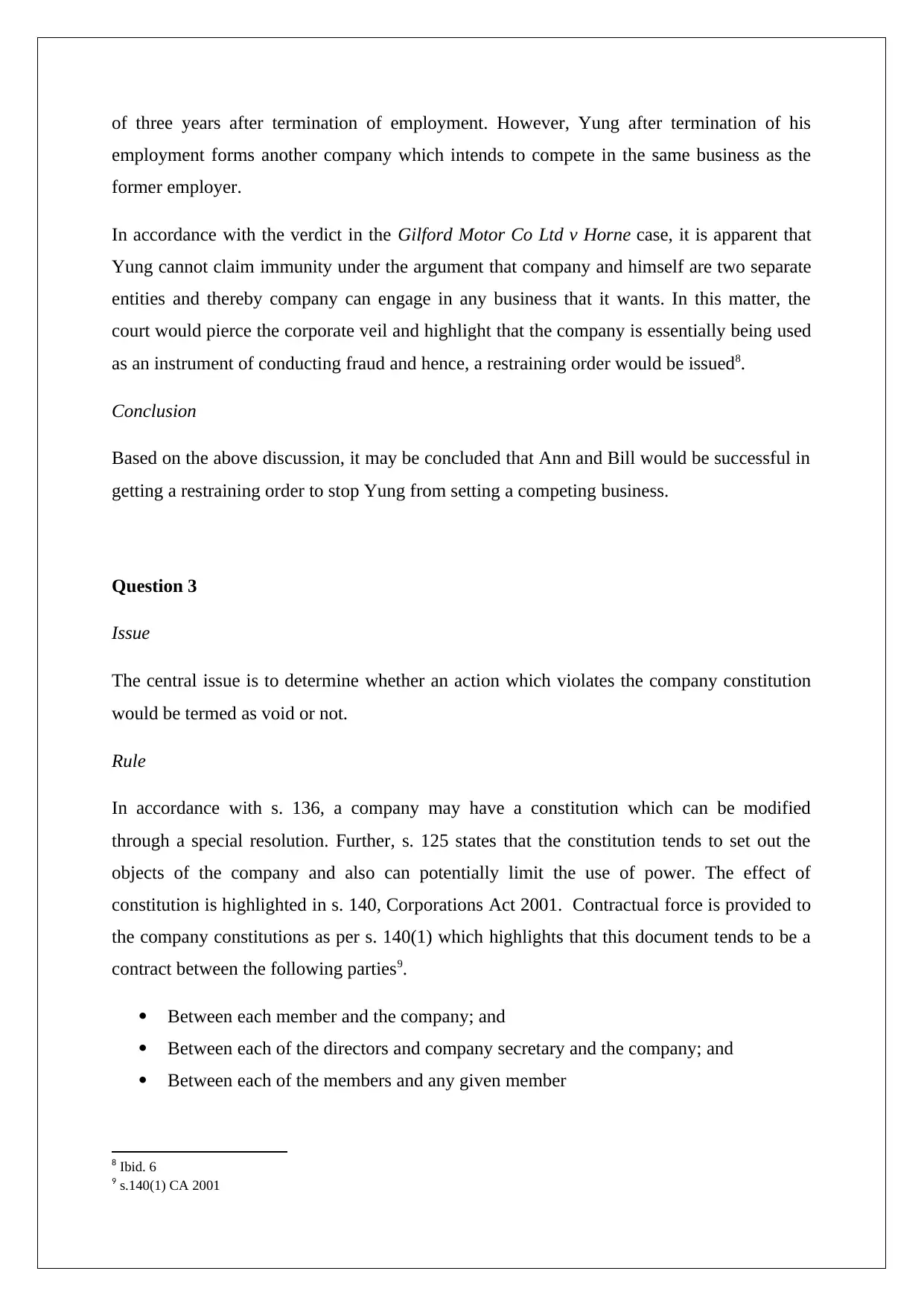
of three years after termination of employment. However, Yung after termination of his
employment forms another company which intends to compete in the same business as the
former employer.
In accordance with the verdict in the Gilford Motor Co Ltd v Horne case, it is apparent that
Yung cannot claim immunity under the argument that company and himself are two separate
entities and thereby company can engage in any business that it wants. In this matter, the
court would pierce the corporate veil and highlight that the company is essentially being used
as an instrument of conducting fraud and hence, a restraining order would be issued8.
Conclusion
Based on the above discussion, it may be concluded that Ann and Bill would be successful in
getting a restraining order to stop Yung from setting a competing business.
Question 3
Issue
The central issue is to determine whether an action which violates the company constitution
would be termed as void or not.
Rule
In accordance with s. 136, a company may have a constitution which can be modified
through a special resolution. Further, s. 125 states that the constitution tends to set out the
objects of the company and also can potentially limit the use of power. The effect of
constitution is highlighted in s. 140, Corporations Act 2001. Contractual force is provided to
the company constitutions as per s. 140(1) which highlights that this document tends to be a
contract between the following parties9.
Between each member and the company; and
Between each of the directors and company secretary and the company; and
Between each of the members and any given member
8 Ibid. 6
9 s.140(1) CA 2001
employment forms another company which intends to compete in the same business as the
former employer.
In accordance with the verdict in the Gilford Motor Co Ltd v Horne case, it is apparent that
Yung cannot claim immunity under the argument that company and himself are two separate
entities and thereby company can engage in any business that it wants. In this matter, the
court would pierce the corporate veil and highlight that the company is essentially being used
as an instrument of conducting fraud and hence, a restraining order would be issued8.
Conclusion
Based on the above discussion, it may be concluded that Ann and Bill would be successful in
getting a restraining order to stop Yung from setting a competing business.
Question 3
Issue
The central issue is to determine whether an action which violates the company constitution
would be termed as void or not.
Rule
In accordance with s. 136, a company may have a constitution which can be modified
through a special resolution. Further, s. 125 states that the constitution tends to set out the
objects of the company and also can potentially limit the use of power. The effect of
constitution is highlighted in s. 140, Corporations Act 2001. Contractual force is provided to
the company constitutions as per s. 140(1) which highlights that this document tends to be a
contract between the following parties9.
Between each member and the company; and
Between each of the directors and company secretary and the company; and
Between each of the members and any given member
8 Ibid. 6
9 s.140(1) CA 2001
Paraphrase This Document
Need a fresh take? Get an instant paraphrase of this document with our AI Paraphraser
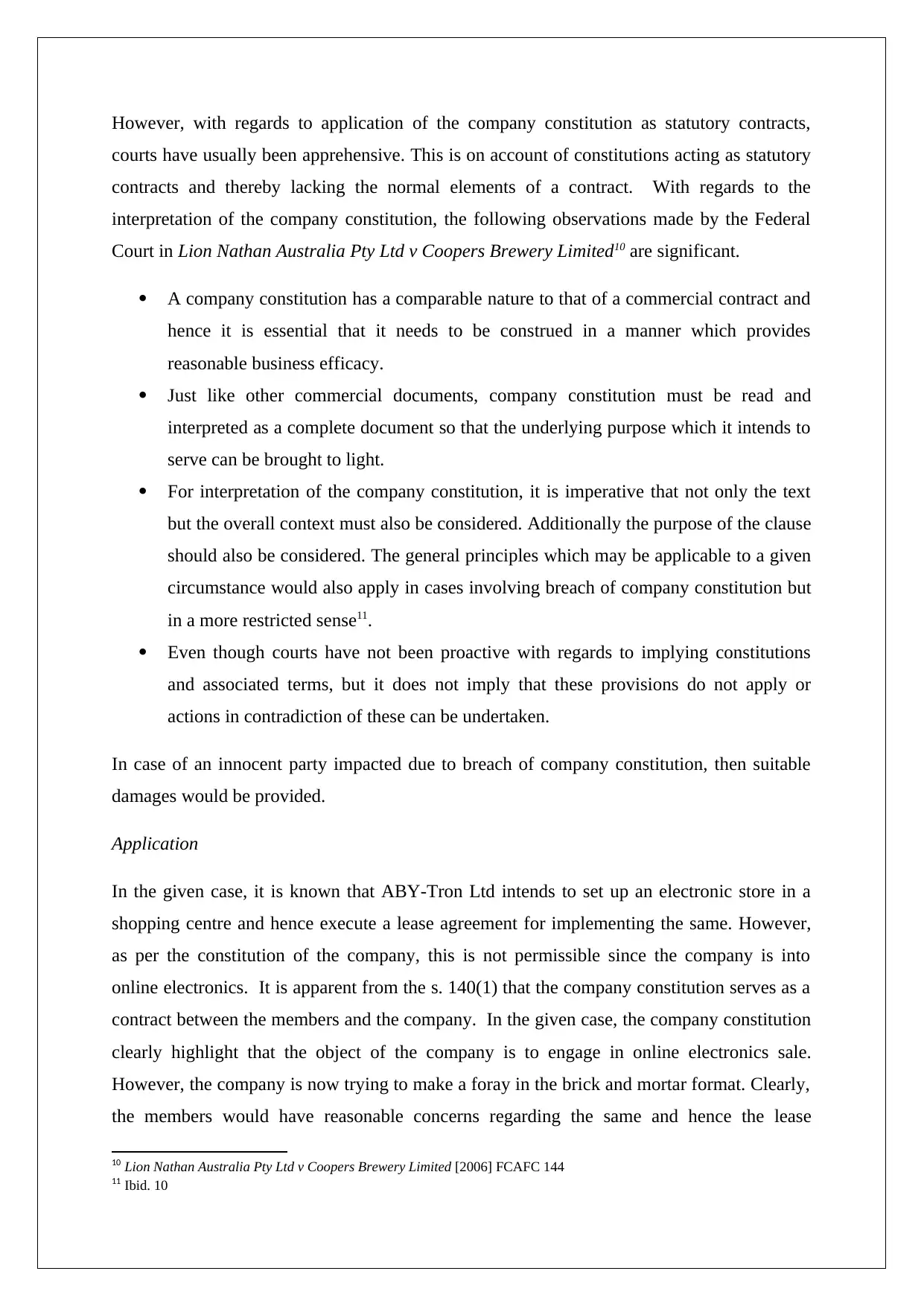
However, with regards to application of the company constitution as statutory contracts,
courts have usually been apprehensive. This is on account of constitutions acting as statutory
contracts and thereby lacking the normal elements of a contract. With regards to the
interpretation of the company constitution, the following observations made by the Federal
Court in Lion Nathan Australia Pty Ltd v Coopers Brewery Limited10 are significant.
A company constitution has a comparable nature to that of a commercial contract and
hence it is essential that it needs to be construed in a manner which provides
reasonable business efficacy.
Just like other commercial documents, company constitution must be read and
interpreted as a complete document so that the underlying purpose which it intends to
serve can be brought to light.
For interpretation of the company constitution, it is imperative that not only the text
but the overall context must also be considered. Additionally the purpose of the clause
should also be considered. The general principles which may be applicable to a given
circumstance would also apply in cases involving breach of company constitution but
in a more restricted sense11.
Even though courts have not been proactive with regards to implying constitutions
and associated terms, but it does not imply that these provisions do not apply or
actions in contradiction of these can be undertaken.
In case of an innocent party impacted due to breach of company constitution, then suitable
damages would be provided.
Application
In the given case, it is known that ABY-Tron Ltd intends to set up an electronic store in a
shopping centre and hence execute a lease agreement for implementing the same. However,
as per the constitution of the company, this is not permissible since the company is into
online electronics. It is apparent from the s. 140(1) that the company constitution serves as a
contract between the members and the company. In the given case, the company constitution
clearly highlight that the object of the company is to engage in online electronics sale.
However, the company is now trying to make a foray in the brick and mortar format. Clearly,
the members would have reasonable concerns regarding the same and hence the lease
10 Lion Nathan Australia Pty Ltd v Coopers Brewery Limited [2006] FCAFC 144
11 Ibid. 10
courts have usually been apprehensive. This is on account of constitutions acting as statutory
contracts and thereby lacking the normal elements of a contract. With regards to the
interpretation of the company constitution, the following observations made by the Federal
Court in Lion Nathan Australia Pty Ltd v Coopers Brewery Limited10 are significant.
A company constitution has a comparable nature to that of a commercial contract and
hence it is essential that it needs to be construed in a manner which provides
reasonable business efficacy.
Just like other commercial documents, company constitution must be read and
interpreted as a complete document so that the underlying purpose which it intends to
serve can be brought to light.
For interpretation of the company constitution, it is imperative that not only the text
but the overall context must also be considered. Additionally the purpose of the clause
should also be considered. The general principles which may be applicable to a given
circumstance would also apply in cases involving breach of company constitution but
in a more restricted sense11.
Even though courts have not been proactive with regards to implying constitutions
and associated terms, but it does not imply that these provisions do not apply or
actions in contradiction of these can be undertaken.
In case of an innocent party impacted due to breach of company constitution, then suitable
damages would be provided.
Application
In the given case, it is known that ABY-Tron Ltd intends to set up an electronic store in a
shopping centre and hence execute a lease agreement for implementing the same. However,
as per the constitution of the company, this is not permissible since the company is into
online electronics. It is apparent from the s. 140(1) that the company constitution serves as a
contract between the members and the company. In the given case, the company constitution
clearly highlight that the object of the company is to engage in online electronics sale.
However, the company is now trying to make a foray in the brick and mortar format. Clearly,
the members would have reasonable concerns regarding the same and hence the lease
10 Lion Nathan Australia Pty Ltd v Coopers Brewery Limited [2006] FCAFC 144
11 Ibid. 10
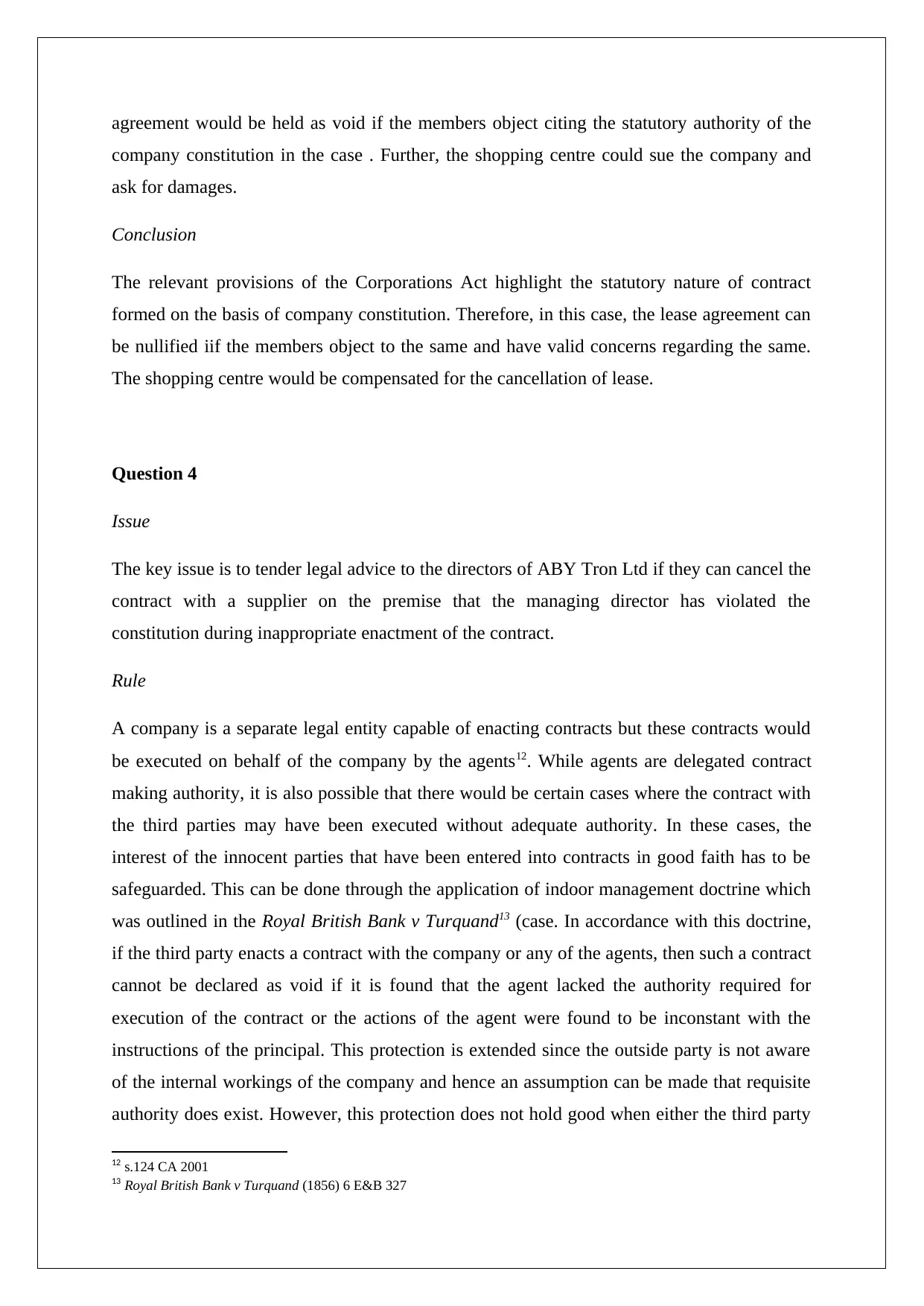
agreement would be held as void if the members object citing the statutory authority of the
company constitution in the case . Further, the shopping centre could sue the company and
ask for damages.
Conclusion
The relevant provisions of the Corporations Act highlight the statutory nature of contract
formed on the basis of company constitution. Therefore, in this case, the lease agreement can
be nullified iif the members object to the same and have valid concerns regarding the same.
The shopping centre would be compensated for the cancellation of lease.
Question 4
Issue
The key issue is to tender legal advice to the directors of ABY Tron Ltd if they can cancel the
contract with a supplier on the premise that the managing director has violated the
constitution during inappropriate enactment of the contract.
Rule
A company is a separate legal entity capable of enacting contracts but these contracts would
be executed on behalf of the company by the agents12. While agents are delegated contract
making authority, it is also possible that there would be certain cases where the contract with
the third parties may have been executed without adequate authority. In these cases, the
interest of the innocent parties that have been entered into contracts in good faith has to be
safeguarded. This can be done through the application of indoor management doctrine which
was outlined in the Royal British Bank v Turquand13 (case. In accordance with this doctrine,
if the third party enacts a contract with the company or any of the agents, then such a contract
cannot be declared as void if it is found that the agent lacked the authority required for
execution of the contract or the actions of the agent were found to be inconstant with the
instructions of the principal. This protection is extended since the outside party is not aware
of the internal workings of the company and hence an assumption can be made that requisite
authority does exist. However, this protection does not hold good when either the third party
12 s.124 CA 2001
13 Royal British Bank v Turquand (1856) 6 E&B 327
company constitution in the case . Further, the shopping centre could sue the company and
ask for damages.
Conclusion
The relevant provisions of the Corporations Act highlight the statutory nature of contract
formed on the basis of company constitution. Therefore, in this case, the lease agreement can
be nullified iif the members object to the same and have valid concerns regarding the same.
The shopping centre would be compensated for the cancellation of lease.
Question 4
Issue
The key issue is to tender legal advice to the directors of ABY Tron Ltd if they can cancel the
contract with a supplier on the premise that the managing director has violated the
constitution during inappropriate enactment of the contract.
Rule
A company is a separate legal entity capable of enacting contracts but these contracts would
be executed on behalf of the company by the agents12. While agents are delegated contract
making authority, it is also possible that there would be certain cases where the contract with
the third parties may have been executed without adequate authority. In these cases, the
interest of the innocent parties that have been entered into contracts in good faith has to be
safeguarded. This can be done through the application of indoor management doctrine which
was outlined in the Royal British Bank v Turquand13 (case. In accordance with this doctrine,
if the third party enacts a contract with the company or any of the agents, then such a contract
cannot be declared as void if it is found that the agent lacked the authority required for
execution of the contract or the actions of the agent were found to be inconstant with the
instructions of the principal. This protection is extended since the outside party is not aware
of the internal workings of the company and hence an assumption can be made that requisite
authority does exist. However, this protection does not hold good when either the third party
12 s.124 CA 2001
13 Royal British Bank v Turquand (1856) 6 E&B 327
⊘ This is a preview!⊘
Do you want full access?
Subscribe today to unlock all pages.

Trusted by 1+ million students worldwide
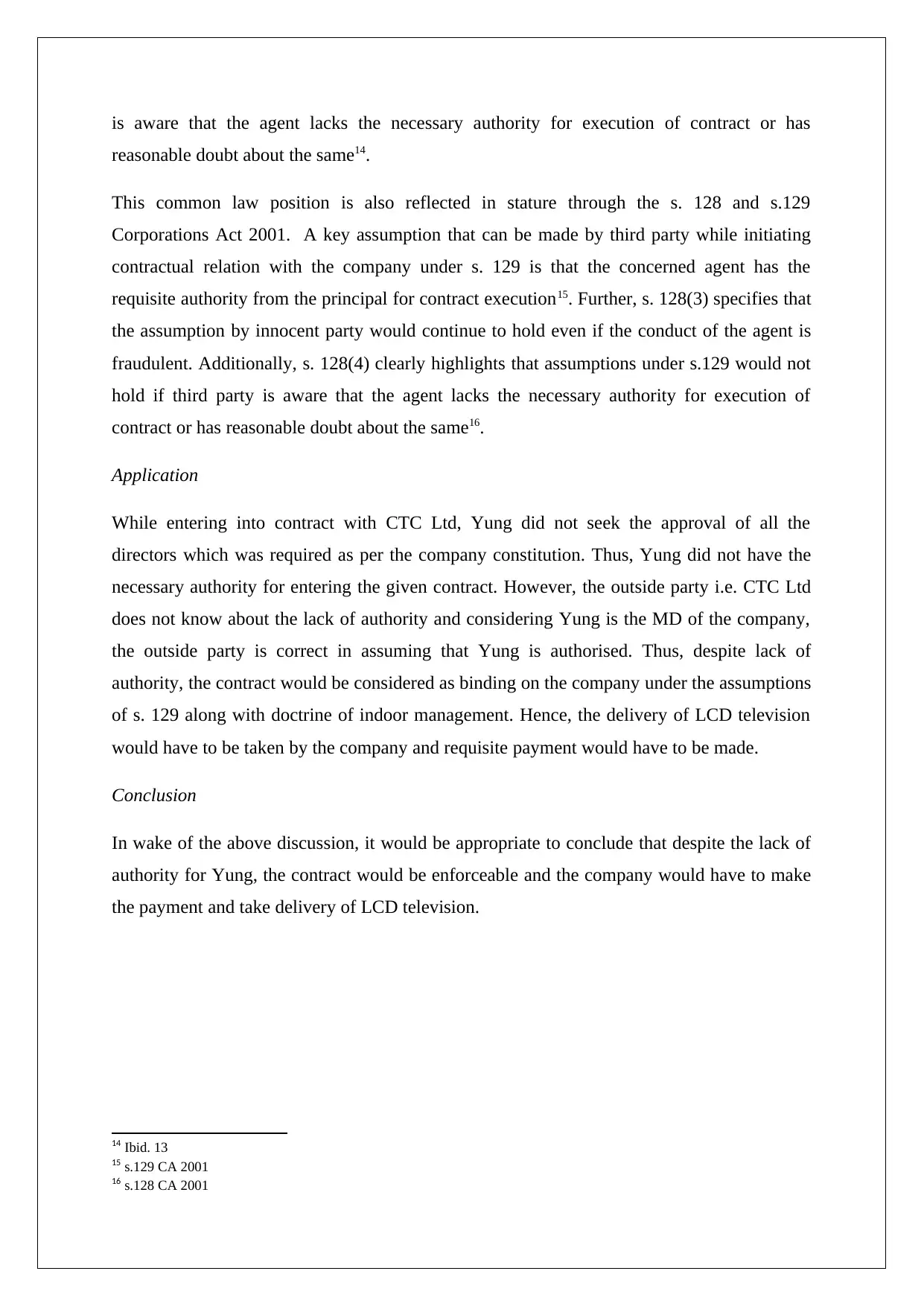
is aware that the agent lacks the necessary authority for execution of contract or has
reasonable doubt about the same14.
This common law position is also reflected in stature through the s. 128 and s.129
Corporations Act 2001. A key assumption that can be made by third party while initiating
contractual relation with the company under s. 129 is that the concerned agent has the
requisite authority from the principal for contract execution15. Further, s. 128(3) specifies that
the assumption by innocent party would continue to hold even if the conduct of the agent is
fraudulent. Additionally, s. 128(4) clearly highlights that assumptions under s.129 would not
hold if third party is aware that the agent lacks the necessary authority for execution of
contract or has reasonable doubt about the same16.
Application
While entering into contract with CTC Ltd, Yung did not seek the approval of all the
directors which was required as per the company constitution. Thus, Yung did not have the
necessary authority for entering the given contract. However, the outside party i.e. CTC Ltd
does not know about the lack of authority and considering Yung is the MD of the company,
the outside party is correct in assuming that Yung is authorised. Thus, despite lack of
authority, the contract would be considered as binding on the company under the assumptions
of s. 129 along with doctrine of indoor management. Hence, the delivery of LCD television
would have to be taken by the company and requisite payment would have to be made.
Conclusion
In wake of the above discussion, it would be appropriate to conclude that despite the lack of
authority for Yung, the contract would be enforceable and the company would have to make
the payment and take delivery of LCD television.
14 Ibid. 13
15 s.129 CA 2001
16 s.128 CA 2001
reasonable doubt about the same14.
This common law position is also reflected in stature through the s. 128 and s.129
Corporations Act 2001. A key assumption that can be made by third party while initiating
contractual relation with the company under s. 129 is that the concerned agent has the
requisite authority from the principal for contract execution15. Further, s. 128(3) specifies that
the assumption by innocent party would continue to hold even if the conduct of the agent is
fraudulent. Additionally, s. 128(4) clearly highlights that assumptions under s.129 would not
hold if third party is aware that the agent lacks the necessary authority for execution of
contract or has reasonable doubt about the same16.
Application
While entering into contract with CTC Ltd, Yung did not seek the approval of all the
directors which was required as per the company constitution. Thus, Yung did not have the
necessary authority for entering the given contract. However, the outside party i.e. CTC Ltd
does not know about the lack of authority and considering Yung is the MD of the company,
the outside party is correct in assuming that Yung is authorised. Thus, despite lack of
authority, the contract would be considered as binding on the company under the assumptions
of s. 129 along with doctrine of indoor management. Hence, the delivery of LCD television
would have to be taken by the company and requisite payment would have to be made.
Conclusion
In wake of the above discussion, it would be appropriate to conclude that despite the lack of
authority for Yung, the contract would be enforceable and the company would have to make
the payment and take delivery of LCD television.
14 Ibid. 13
15 s.129 CA 2001
16 s.128 CA 2001
1 out of 7
Related Documents
Your All-in-One AI-Powered Toolkit for Academic Success.
+13062052269
info@desklib.com
Available 24*7 on WhatsApp / Email
![[object Object]](/_next/static/media/star-bottom.7253800d.svg)
Unlock your academic potential
Copyright © 2020–2026 A2Z Services. All Rights Reserved. Developed and managed by ZUCOL.





